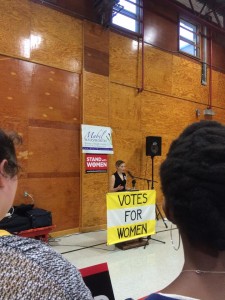This essay is adapted from a speech delivered by Advocacy Services Coordinator Catherine Kurr at the Women’s Equality Day Rally on August 26th in Bangor.
On August 26th in the United States we celebrate Women’s Equality Day.
It is a day to give thanks to our foremothers who worked tirelessly to get women the right to vote with the enactment of the 19th Amendment to the Constitution. This act has shaped not only the experience of women in the U.S., but has had a great impact on our nation. It was a major step toward gender equality, and so we recognize the day.
This year, we celebrated 95 years since the day of the passage of the 19th Amendment. However, with just five years shy of a century I am discouraged by how far we have to go. This is why it is important each year on this day to celebrate our achievements but also to reflect on the steps we need to take to progress.
When I think of women’s equality I am talking about more than the right to vote, or equal pay. I believe that true equality means equal opportunities and access to education, employment, and healthcare.
In a recent survey conducted by the Ms. Foundation, a strong majority of people viewed these community-wide issues as intertwined and understood “women’s issues” to be a much broader set of topics than our media or our political discourse tends to portray.
Working at Spruce Run-Womancare Alliance—the domestic violence resource center serving the Penobscot County and Piscataquis County region—I know all too well that we have not reached true equality, because violence perpetrated against women is a horrifying reality. If the choices we are forced to make are based on fear, they are not equal choices.
On average more than three women each day are murdered by their intimate partners in the United States. One in four women will report experiencing violence by an intimate partner at some point in her lifetime. Women make up 84 percent of the reported survivors of spousal abuse and 86 percent of survivors of dating abuse. On average, one in five women in college will be sexually assaulted, and women between the ages of 20 and 24 have the highest risk of experiencing interpersonal violence.
These are terrifying numbers, numbers that are no different in Maine.
Last year, in one typical 24-hour period, 439 victims of abuse sought support from a domestic violence resource center in Maine. 210 of those people were living in an emergency shelter or transitional housing program—113 were children and 97 were adults. That day, 113 hotline calls were answered in our state, which is about 4 calls per hour.
These numbers are heartbreaking, but not shocking.
Early on girls are told to live in fear. We are given a set of cultural rules that enforce this fear. The rules are: don’t walk alone; don’t walk at night; cover up your skin; don’t take that drink; look over your shoulders; hold keys between your fingers; wear a whistle around your neck. We are told to follow these rules, and to live in fear. We hope that if we do this we will be safe. But what if we don’t follow the rules? We are told that we are responsible for any violence perpetrated against us. With this list, and these consequences, we grow up to believe it is inevitable that we will become one of “those” statistics.
This reality is not equality.
For over two decades we have had the Violence Against Women Act on the books—a law that has strengthened the response to survivors, and helps fund numerous programs that work toward ending violence across our country. In our state we have improved our criminal justice, child welfare, and health care response to survivors. We have thriving prevention programs that talk openly about healthy and unhealthy relationships.
These accomplishments are ones to be celebrated, but I know that I am not alone in thinking we have a long way to go. The Ms. Foundation survey found that there is a large belief that we have a lot of work to do to reach gender equality. At Spruce Run-Womancare Alliance, we are actively working each day to change our culture toward one of equality, but I for one know we can’t do it alone.
I would like to challenge everyone to participate in creating this change.
Now is the time to let our young men and women know that in the State of Maine we will strive to end interpersonal violence. If we all are active participants we will be one step closer to true gender equality. We can work together to shape our culture to one that fosters healthy relationships, assures safety and support for victims, and values all people equally. Let’s make it so that in five years, on Women’s Equality Day—100 years after women received the right to vote—we can say that our community is one that is always moving closer to true equality.
